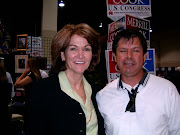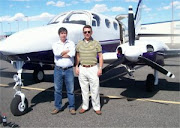
Lou Dobbs, who has added a nationally syndicated radio show to his role as host of the highly rated CNN program, is among 50 or so talk radio personalities participating in the 2008 Hold Their Feet to the Fire event. Broadcasting from the Phoenix Park Hotel on Capitol Hill on September 10 and 11, talk radio hosts from all across the United States will devote their programs to the issue of immigration.
Hold Their Feet to the Fire has become an annual event, attracting some of the leading talk radio programs to the nation’s capital to raise an important issue that many of the nation’s leaders would prefer to ignore: immigration reform that places the interests of the American people first.
The 2008 Hold Their Feet to the Fire event is being organized by the FAIR Congressional Task Force (FCTF), a 501(c)(4) organization affiliated with FAIR. Hold Their Feet to the Fire is co-sponsored by Roger Hedgecock, host of a popular talk radio program on KOGO in San Diego. Hedgecock originated the Hold Their Feet to the Fire concept and has worked with FAIR and FCFT to expand it into a major annual event.
Talk radio has had an undeniable impact on the outcome of the immigration debate. This year’s Hold Their Feet to the Fire event is designed to provide millions of talk radio listeners in every state with a high profile forum to express their views about this vital national issue.
Energized by the highly successful Hold Their Feet to the Fire event which took place in April 2007, talk radio and their listeners generated unprecedented public opposition to the Senate amnesty and guest worker bill that was introduced the following month. The level and intensity of public opposition to amnesty and millions of new guest workers was directly responsible for the defeat of the bill that had the backing of the White House and many congressional leaders. Hold Their Feet to the Fire is designed to ensure that as a new administration and a new Congress take office in 2009 they are fully aware of overwhelming public support for immigration reform legislation without amnesty or guest worker provisions, and for overall reductions in immigration levels.
Arguably no media figure has had a greater impact on the immigration debate than Lou Dobbs. Dobbs’ CNN program carried live feeds from the 2007 Hold Their Feet to the Fire, and his relentless coverage of the clear sell-out of the public interest was instrumental in the defeat of the Senate amnesty bill. Dobbs now has a daily radio broadcast as well, syndicated nationally on the United Stations Radio Network. The inclusion of Dobbs’ radio program to the 2008 Hold Their Feet to the Fire line-up adds star power to an already high profile event.
Like FAIR, the mission of the FCTF is to educate the American public about the importance of adopting immigration policies that serve the public interest. The reputation that FAIR and FCTF enjoy with leading media organizations makes it possible to communicate our agenda for true immigration reform into homes across America. We are honored by the trust many in the media place in us, as exemplified by their willingness to participate in Hold Their Feet to the Fire 2008.
Hold Their Feet to the Fire has become an annual event, attracting some of the leading talk radio programs to the nation’s capital to raise an important issue that many of the nation’s leaders would prefer to ignore: immigration reform that places the interests of the American people first.
The 2008 Hold Their Feet to the Fire event is being organized by the FAIR Congressional Task Force (FCTF), a 501(c)(4) organization affiliated with FAIR. Hold Their Feet to the Fire is co-sponsored by Roger Hedgecock, host of a popular talk radio program on KOGO in San Diego. Hedgecock originated the Hold Their Feet to the Fire concept and has worked with FAIR and FCFT to expand it into a major annual event.
Talk radio has had an undeniable impact on the outcome of the immigration debate. This year’s Hold Their Feet to the Fire event is designed to provide millions of talk radio listeners in every state with a high profile forum to express their views about this vital national issue.
Energized by the highly successful Hold Their Feet to the Fire event which took place in April 2007, talk radio and their listeners generated unprecedented public opposition to the Senate amnesty and guest worker bill that was introduced the following month. The level and intensity of public opposition to amnesty and millions of new guest workers was directly responsible for the defeat of the bill that had the backing of the White House and many congressional leaders. Hold Their Feet to the Fire is designed to ensure that as a new administration and a new Congress take office in 2009 they are fully aware of overwhelming public support for immigration reform legislation without amnesty or guest worker provisions, and for overall reductions in immigration levels.
Arguably no media figure has had a greater impact on the immigration debate than Lou Dobbs. Dobbs’ CNN program carried live feeds from the 2007 Hold Their Feet to the Fire, and his relentless coverage of the clear sell-out of the public interest was instrumental in the defeat of the Senate amnesty bill. Dobbs now has a daily radio broadcast as well, syndicated nationally on the United Stations Radio Network. The inclusion of Dobbs’ radio program to the 2008 Hold Their Feet to the Fire line-up adds star power to an already high profile event.
Like FAIR, the mission of the FCTF is to educate the American public about the importance of adopting immigration policies that serve the public interest. The reputation that FAIR and FCTF enjoy with leading media organizations makes it possible to communicate our agenda for true immigration reform into homes across America. We are honored by the trust many in the media place in us, as exemplified by their willingness to participate in Hold Their Feet to the Fire 2008.



































